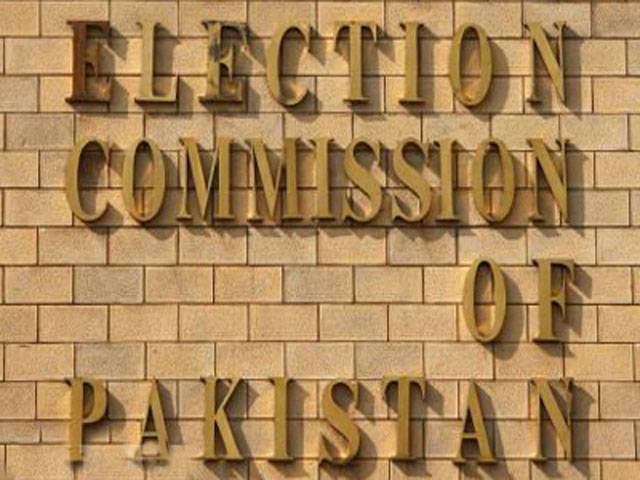Islamabad -
The Election Commission of Pakistan (ECP) has communicated to the registrars of all the five High Courts to incorporate the respective inputs of the chief justices concerned for the appointment of election tribunals, following a related order of the Sindh High Court issued here on Monday.
In another development, the ECP withheld the notification of women and minorities reserved seats for the national and provincial assemblies following the Balochistan High Court’s order. The commission was to issue the notification on Monday last.
In separate letters written to the registrars of Lahore, Peshawar, Islamabad, Sindh and Balochistan High Courts, the Director General (Elections) at the ECP Syed Sher Afgan cited the SHC’s Monday order while requesting for the consultations of all the five CJs regarding ETs appointment.
Earlier, the SHC had dissolved the three ECP-formed ETs in Sindh declaring their formation as unconstitutional on the grounds that the SHC was not consulted prior to the ETs formation. Prior to that, the registrar SHC, in a letter to the ECP, had also shared the court’s reservations over the ETs appointment without consulting the SHC.
Moreover, the commission has directed the provincial election commissions (PECs) to work in coordination with the registrar offices for the incorporation of the CJs HCs input in appointing the ETs.
Requesting anonymity, a senior ECP official said that the commission had decided to show complete compliance with the SHC instructions despite that the constitutional and electoral provisions, he said, fully empowered the chief election commissioner to set up the ETs without requiring to consult any institution including the judiciary. “We’ll fully comply with the court’s orders although there’s no constitutional bar on the CEC to seek judiciary’s permission, consultation or approval for setting up the ETs,” he said adding that the existing ET members would be replaced if so desired by the CJs HCs.
According to the official, the Acting CEC Justice Tassadduq Hussain Jilani strongly supports the appointment of ETs in consultation with the superior judiciary, particularly the high courts. Jilani sworn in as the Acting CEC on Monday in the absence of the CEC Justice (r) Fakhruddin G Ebrahim who is abroad on a four-day official tour.
The ECP official cited the Constitution’s Article 219 (c) and Section 57 (1) and (2) of the Representation of the People Act (RoPA) 1976 in support of his argument on the CEC authority on ETs formation without requiring permission from any institution.
The Article 219(c) states, “Duties of commissioner. The commissioner shall be charged with the duty of:-(c) appointing election tribunals.”
The RoPA 1976 Sections 57 (1) and (2) state, “Appointment of tribunal:-(1) For the trial of election petitions under this act, the commissioner shall appoint as many election tribunals as may be necessary.
(2) An election tribunal shall consist of a person who has been, or is, or, at the time of his retirement as a district and sessions judge, was qualified to be, a judge of a high court.”
On this month’s 13th, the ECP had appointed 14 ETs to hear election petitions that were to start functioning after the official notification of the general polls’ returned candidates. The commission had issued the said notification last week following which the ETs had become functional, before being ruled against by the SHC. Of the 14 ETs, Punjab had five while Sindh, Balochistan and Khyber Pakhtunkhwa had three ETs. In the light of the relevant provisions of Section 67 of the RoPA 1976, the ETs are to decide on an election petition four months after its receipt. These tribunals have complete powers to take any decision on the elections petitions.
Meanwhile, the ECP on Monday had sent the detailed break-up of the women and minorities-reserved seats for all the five parliamentary assemblies to the members election commission (MECs) for their respective approvals in order to notify the same and make it public.
However, the commission withheld the notification following a BHC order that stayed notifying the minorities and women-reserved seats contending that certain general seats in Balochistan were lying vacant on different pretexts and notifying the reserved seats before filling in the vacant general seats would negatively affect the province’s representation in the National Assembly.
Friday, April 19, 2024
ECP writes to registrars for HCs’ input on ETs appointment

Faizabad commission report leaked, it should be made public now, suggests Abbasi
11:11 AM | April 19, 2024
MPCL makes new gas discovery in Sindh’s Marighazj formation
April 19, 2024
A Tense Neighbourhood
April 19, 2024
Dubai Underwater
April 19, 2024
X Debate Continues
April 19, 2024
Hepatitis Challenge
April 18, 2024
IMF Predictions
April 18, 2024
Kite tragedy
April 19, 2024
Discipline dilemma
April 19, 2024
Urgent plea
April 19, 2024
Justice denied
April 18, 2024
AI dilemmas unveiled
April 18, 2024
ePaper - Nawaiwaqt
Advertisement
Nawaiwaqt Group | Copyright © 2024





